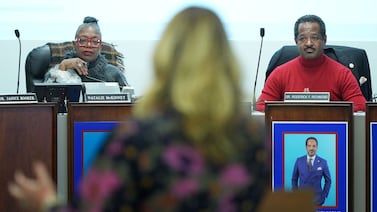Sign up for Chalkbeat’s free weekly newsletter to keep up with how education is changing across the U.S.
Schools are scrambling to plan for what could become a massive budget hole after the Trump administration said Monday it would not release nearly $7 billion in K-12 education funds that had been expected to go out July 1.
The withheld funds, which were approved by Congress earlier this year, include all $890 million meant to help English learners develop their language skills and $375 million to provide academic support to the children of migrant farmworkers, according to an email that was sent to states by the U.S. Department of Education and obtained by Education Week.
The money being held back also includes $2.2 billion in Title II funds that support teacher training, $1.4 billion for before- and after-school programs, and $1.3 billion in funding for academic enrichment programs, such as STEM and college and career counseling.
Several states, Democratic lawmakers, and education advocacy groups are calling on the Trump administration to release the money, calling the move an illegal act of impoundment. The Education Department referred inquiries to the White House Office of Management and Budget, which said Wednesday that the move was part of an ongoing programmatic review of education funding and that no decisions had been made yet.
But the Office of Management and Budget spokesperson also said its initial findings “have shown that many of these grant programs have been grossly misused to subsidize a radical leftwing agenda.”
The spokesperson said the office had found examples in which New York schools used English language acquisition funds to “promote illegal immigrant advocacy organizations” while Washington state used funds to “direct illegal immigrants towards scholarships intended for American students.” In another instance, the spokesperson wrote, school improvement funds were used to hold a seminar on “queer resistance in the arts.”
The office did not provide documentation for its findings, and a spokesperson did not immediately respond to a request for that documentation.
Congress had previously approved this funding as part of a continuing budget resolution in March, which was supposed to keep K-12 education funding mostly level for the 2025-26 school year. But the Trump administration told states on Monday that it has not yet decided how this money will be allocated, and won’t send funding notices until it completes a review, the email obtained by Education Week stated.
In a Tuesday press conference, California education officials said the Trump administration’s letter indicated the money was being held back to ensure the funds were spent in accordance with the president’s priorities. As it has in other recent instances, California will “continue to pursue all available legal remedies to the Trump administration’s unlawful withholding of federal funds appropriated by Congress,” Superintendent Tony Thurmond told reporters.
The unreleased funding aligns with many of the K-12 budget cuts the Trump administration proposed to make in fiscal 2026 — cuts that Congress has yet to vote on and which shouldn’t affect schools’ bottom lines until the 2026-27 school year.
In a written statement, U.S. Sen. Patty Murray, the vice chair of the Senate appropriations committee who also sits on the Senate education committee, said the funding holdup had forced schools to delay hiring staff and pause initiatives for students.
“Local school districts can’t afford to wait out lengthy court proceedings to get the federal funding they’re owed — nor can they make up the shortfall, especially not at the drop of a pin,” Murray wrote.
Ray Hart, the executive director of the Council of the Great City Schools, which represents many of the nation’s large urban districts, said schools were counting on this money to pay teachers and principals, provide summer school, and cover school safety costs.
Holding back the after-school funding affects nearly 10,000 after-school programs, said Jodi Grant, the executive director of Afterschool Alliance, and has left many worried they will have to close.
In a Tuesday press conference, advocates for immigrant children and English learners sounded the alarm about how withholding Title III funds would hurt schools’ ability to hire translators and staff to work with multilingual students and host workshops for immigrant families.
Some summer programs that rely on Title III funds to train school staff were put on hold, said Susanne Pena, an assistant teaching professor at Florida International University. (The Trump administration gutted the Education Department office that used to oversee Title III earlier this year.)
“Families who do not speak English could be cut off from schools and the support system that they need in order to help their students be successful,” said Anabolena DeGenna, the superintendent of Oxnard School District in southern California.
This story has been updated to include a comment from the Office of Management and Budget.
National reporting intern Norah Rami contributed reporting.
Kalyn Belsha is a senior national education reporter based in Chicago. Contact her at kbelsha@chalkbeat.org.




